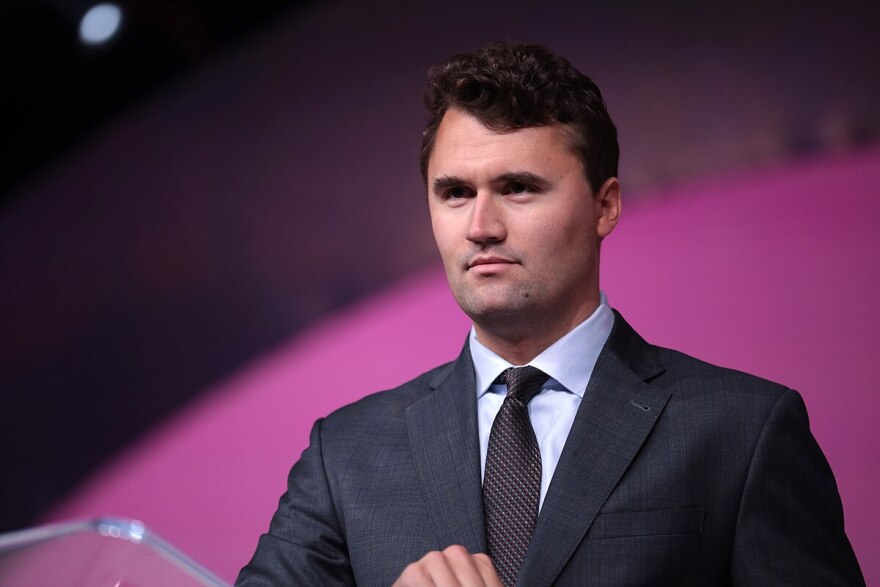In a closely watched dispute about First Amendment rights, attorneys for a biologist who was fired because of a social media post after the murder of conservative leader Charlie Kirk squared off against lawyers for the state on Monday.
Biologist Brittney Brown, who worked for the Florida Fish and Wildlife Conservation Commission studying shorebirds and seabirds in the area of Tyndall Air Force Base in the Panhandle, alleges in the lawsuit that her firing on Sept. 15 — five days after Kirk was shot during an appearance at a Utah university — violated her First Amendment rights.
Attorneys for Florida Fish and Wildlife Conservation Commission Executive Director Roger Young and Melissa Tucker, a division director, said the agency fired Brown to “prevent foreseeable disruption, reputational harm and loss of public trust. The agency did not police ideology; it protected credibility central to its mission.”
U.S. District Judge Mark Walker on Monday heard arguments in Brown’s request for a preliminary injunction requiring the state agency to reinstate her and prohibit them from retaliating against her for the social media post.
Brown was fired after she reposted on her personal Instagram account a post from an account called “@whalefact.” The post said, “the whales are deeply saddened to learn of the shooting of charlie kirk, haha just kidding, they care exactly as much as charlie kirk cared about children being shot in their classrooms, which is to say, not at all,” according to the lawsuit.
Taylor Greene, an attorney who represents the state agency, told the judge that Brown’s employment was terminated because of “hundreds of complaints” about the post. Allowing her to remain on the job would “disrupt operations and erode public trust” in the agency, Greene, a Tallahassee-based lawyer with the Lawson Huck Gonzalez PLLC firm, argued.
The agency’s “efficiency interests” outweigh Brown’s free speech rights, Greene said.
But Walker asked Greene whether Brown’s repost should be considered an example of an important debate about gun control, which is a matter of public concern.
“Just because something’s inappropriate or controversial, how is it not covered by the First Amendment?” Walker asked.
Brown’s termination was “based on internal policy,” Greene answered.
But Gary Edinger, who represents Brown, told Walker that Brown’s social media reposting was protected private speech made on her own time from her personal account.
“It’s a political statement on a matter that everyone in America is still talking about,” Edinger said.
Walker, however, questioned whether Edinger had met the requirements for a preliminary injunction. The judge said the burden was on Edinger to show that Brown’s continued employment would not have had an adverse impact on the state agency.
The judge pointed to court records showing the timeline of Brown’s firing, which came a day after Libs of TikTok, a conservative social media account, shared a screenshot of Brown’s repost and called for her termination.
Despite “deeply disturbing facts” surrounding the timeline, Walker suggested the “undeveloped record” in the case might not be strong enough to show that Brown’s speech rights outweighed the state agency’s interests in operating smoothly.
“You don’t get to fire somebody just because the public is yapping at you,” although workers “don’t have an absolute right” to employment, Walker noted.
The response to Brown’s post was “just a blip,” Edinger argued.
“Things going viral on the internet today, that happens every day,” he said. “You can’t invoke that bogeyman as a cover for content-based, viewpoint-based discrimination.”
Much of Monday’s arguments centered on a legal concept known as a “heckler’s veto.” which occurs when government officials silence an employee because of fear of a hostile reaction from the public.
Attorneys for the state agency argued that the concept did not apply in Brown’s case.
“The First Amendment does not shield public employees from the consequences of speech that undermines the effectiveness, credibility or public trust on which their agencies depend. … Even if the post had some political dimension, FWC’s interest in maintaining credibility and neutrality far outweighs any minimal expressive value,” the officials’ attorneys wrote in a court filing last month.
But in a brief filed Friday, Brown’s lawyers argued that the disputed comments were “civic commentary on a matter of public concern.”
“Mr. Kirk’s legacy continues to be hotly contested in the political realm, and Plaintiff’s repost of the Whale Statement speaks directly to that legacy and the larger context of gun violence in the United States. Multiple bills have been submitted to the Florida Legislature for the upcoming 2026 session memorializing Charlie Kirk,” the brief said.
Walker did not rule immediately on Monday, but he said he intended to fast-track the case.
Brown’s firing is among a number of sanctions state and local agencies, universities and school boards are pursuing against Kirk’s critics in the aftermath of his assassination.
Speaking to reporters after Monday’s hearing, Edinger, a prominent First Amendment attorney based in Gainesville, said he has been contacted by other government employees who were fired for posting negative comments about Kirk.
“For one thing, it is an unprecedented response. I have no explanation for it,” Edinger said, adding that it is “extremely unusual for people to be punished for that.”
Edinger remained confident that Walker ultimately would rule in Brown’s favor, even if he does not grant a preliminary injunction forcing her reinstatement.
“I think it’s going to be an important statement saying that the government can only go so far and that we live in a free society and we have to tolerate a diversity of opinion, amongst our peers, our neighbors and other public employees,” Edinger said.



